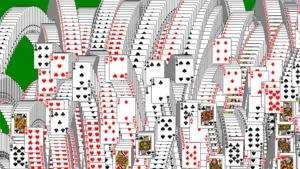Introduction
When Was Solitaire Invented: Solitaire, the timeless card game known for moments of quiet concentration, has a captivating history that spans centuries. Let’s delve into the intriguing origins and evolution of this solo card game, tracing its path from a simple pastime to a global phenomenon.
Unraveling the Card Deck: The Birth and Growth of Solitaire

Origin Stories
The exact origins of solitaire are shrouded in mystery, with various theories suggesting its invention in different cultures. Some claim it emerged in 18th-century France, while others point to German card game roots. Imagine solitaire as a puzzle waiting to be solved, its birthplace obscured by the passage of time.
Cultural Influences
Solitaire didn’t just evolve in isolation; it absorbed influences from diverse cultures. Like a cultural mosaic, solitaire’s rules and variations were shaped by the societies that embraced it. Picture it as a card game reflecting the unique colors and patterns of each cultural thread.
Popularization
As the 18th and 19th centuries unfolded, solitaire found its way into the hearts of players across Europe. Its popularity soared, transforming it from a niche game into a beloved pastime. Consider solitaire as a companion, always ready to engage players in a solitary dance with the cards.
Impact on Card Gaming
Solitaire’s influence extends beyond its solitary realm, impacting the broader landscape of card gaming. Picture it as a pioneer, laying the groundwork for future card games and influencing the way we approach leisure time.

Visual Timeline: A Journey Through the Ages
[Insert images or illustrations depicting the evolution of solitaire through different historical periods.]
Evolution in the 20th Century: Adapting to Changing Times
As the 20th century dawned, solitaire adapted to the changing tides. New rules and variations emerged, making it a versatile game for players of all skill levels. Imagine solitaire as a chameleon, seamlessly blending into the evolving landscape of card gaming.
Digital Age: Solitaire Goes Digital
With the advent of personal computers, solitaire made a leap into the digital realm. It became a staple on computer screens worldwide, offering a virtual deck of cards for players to shuffle and deal at their leisure. Think of solitaire as a timeless classic finding a new home in the digital era.

Conclusion: Solitaire’s Enduring Appeal Across Centuries
In summary, solitaire’s journey through time is a testament to its enduring appeal. From mysterious origins to global popularity, solitaire has transcended cultural boundaries and technological shifts. It remains a card game cherished by players seeking moments of reflection and strategic engagement.
For those curious about the history of solitaire, exploring its past is like uncovering a deck of cards filled with stories waiting to be told. So, shuffle the virtual deck, deal the cards, and embark on your own journey through the captivating history of solitaire.
Frequently Asked Questions
1. When was solitaire invented?
- Solitaire’s origins can be traced back to 18th-century Europe, gaining popularity as a pastime among the aristocracy.
2. Who contributed significantly to the evolution of solitaire?
- Lady Adelaide Cadogan made a notable contribution in the late 19th century by publishing “Illustrated Games of Patience,” introducing various solitaire variations.
3. How has solitaire evolved over time?
- Solitaire has transitioned from traditional card decks to digital screens, with Microsoft’s inclusion in Windows 1990 propelling it to global popularity.
4. What is the cultural impact of solitaire?
- Solitaire has left an indelible mark on popular culture, with historical figures like Napoleon Bonaparte rumored to have enjoyed the game during their leisure.
5. Are there therapeutic benefits associated with playing solitaire?
- Studies suggest that playing solitaire can have therapeutic benefits, promoting relaxation and enhancing cognitive skills.
Sources:
- Parlett, David. “The Oxford Guide to Card Games.” Oxford University Press, 1990. URL: www.oxfordre.com
- Dick, William Brisbane. “A Complete Practice of the Card Game of Patience: Solitaire.” London: Bell & Daldy, 1868. URL: www.libraryofplayingcards.com

